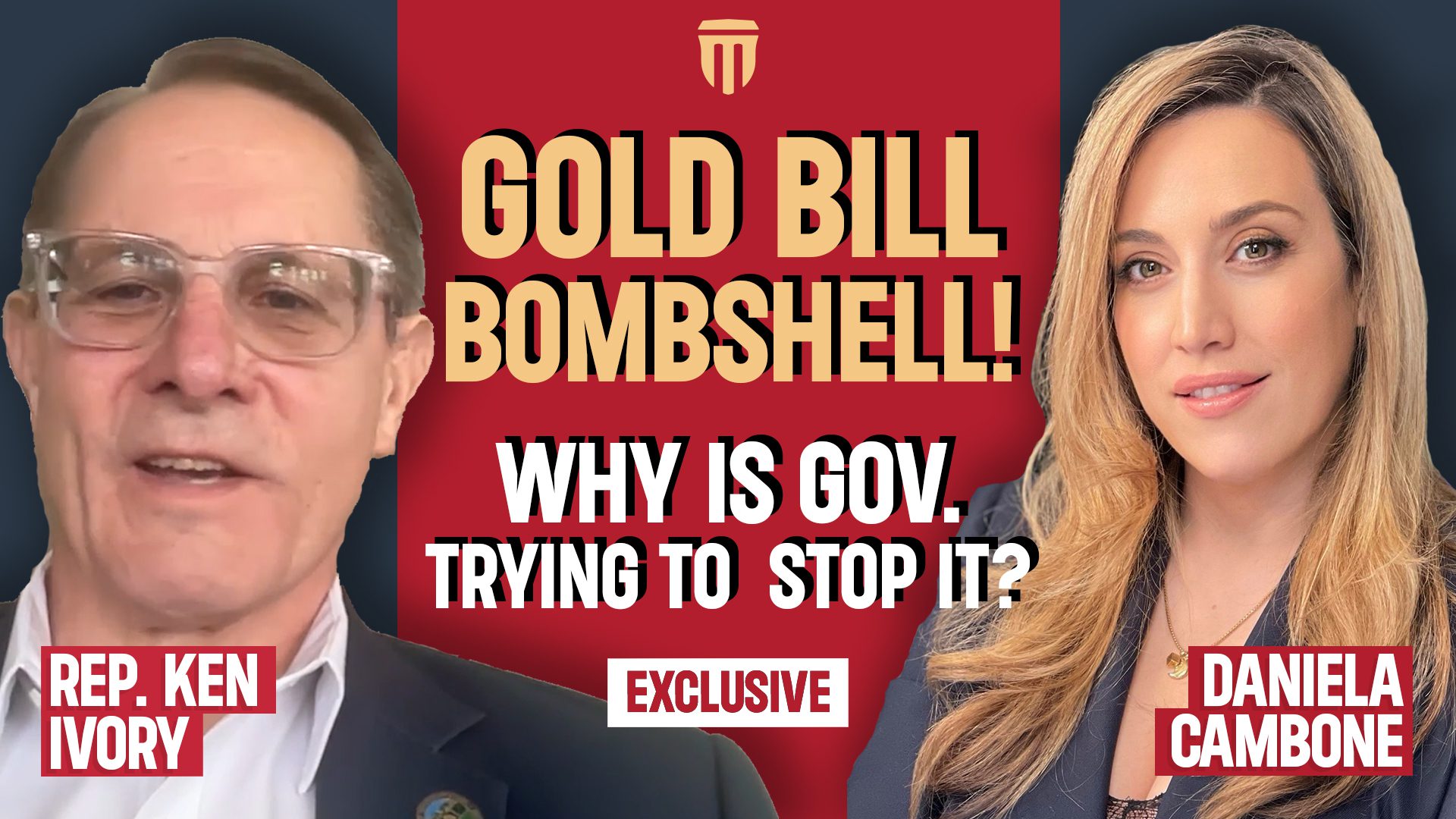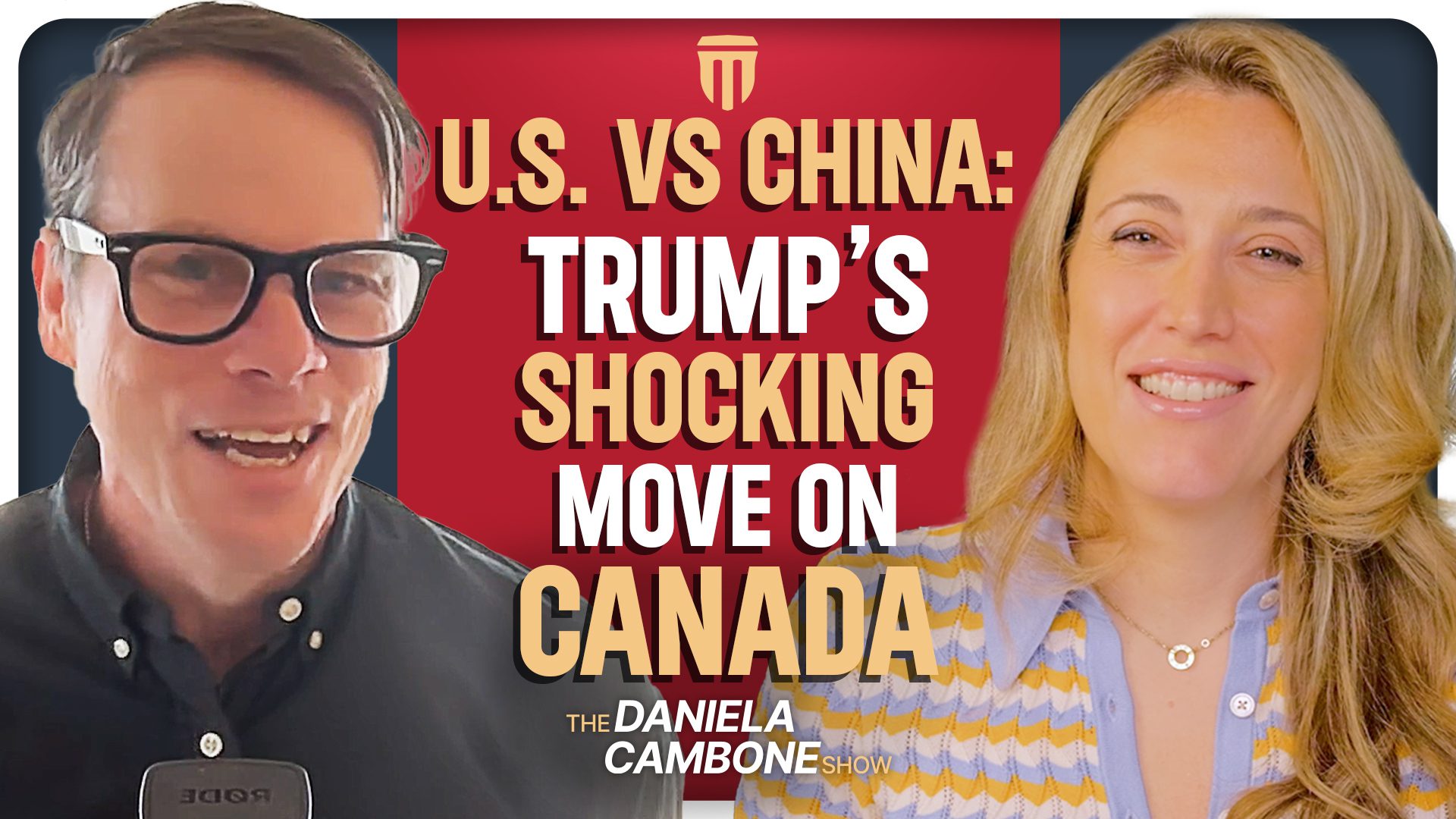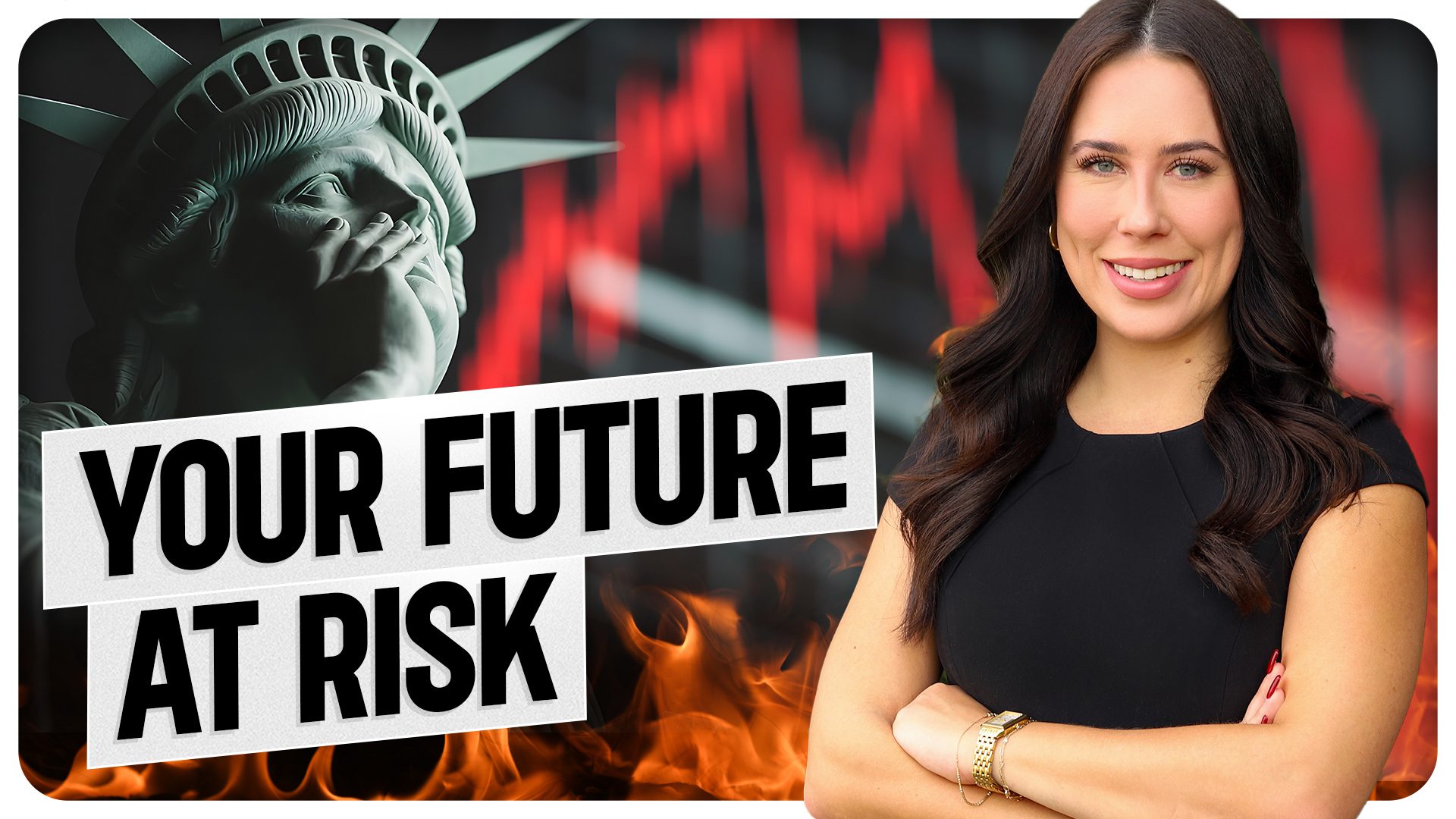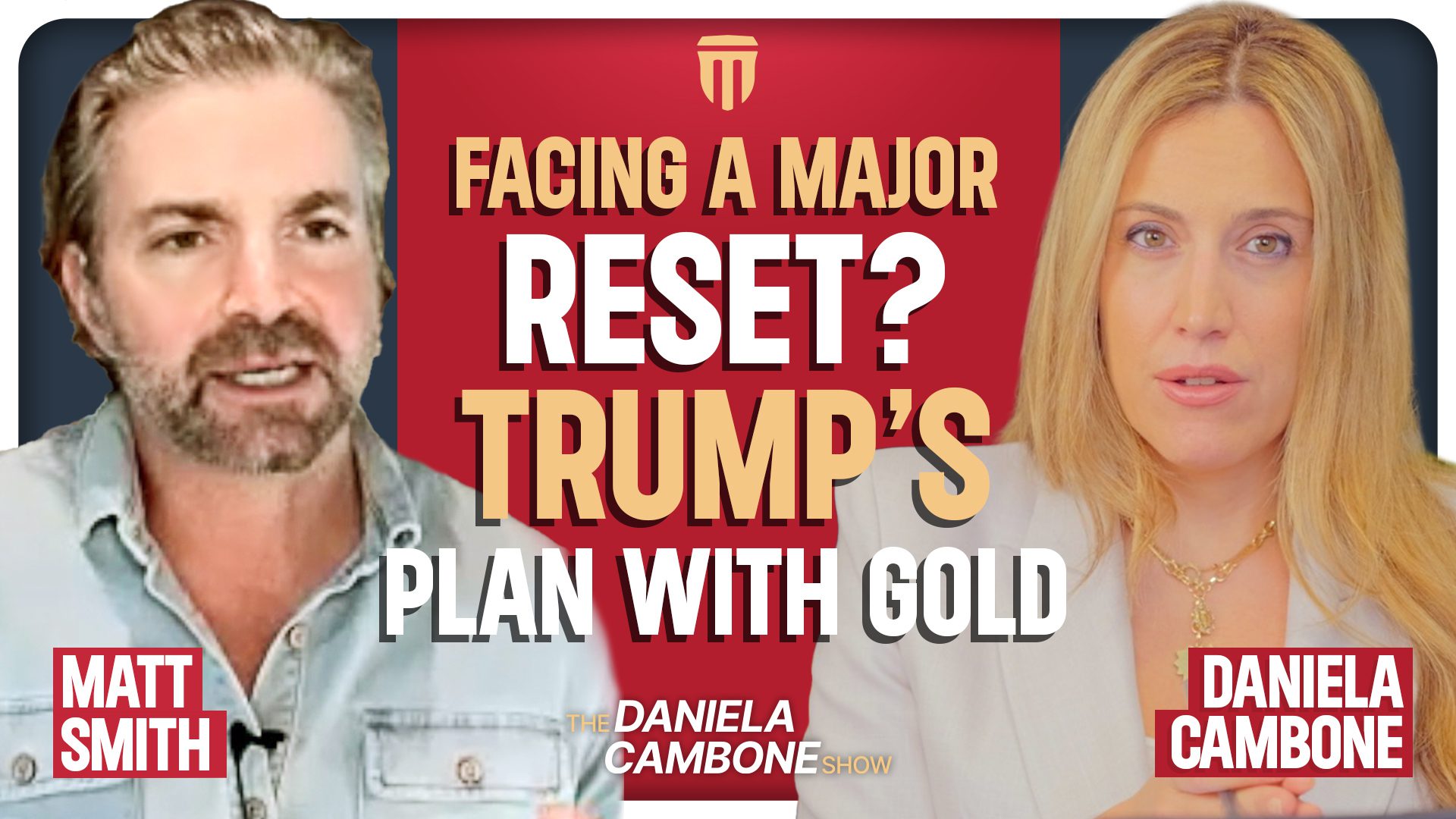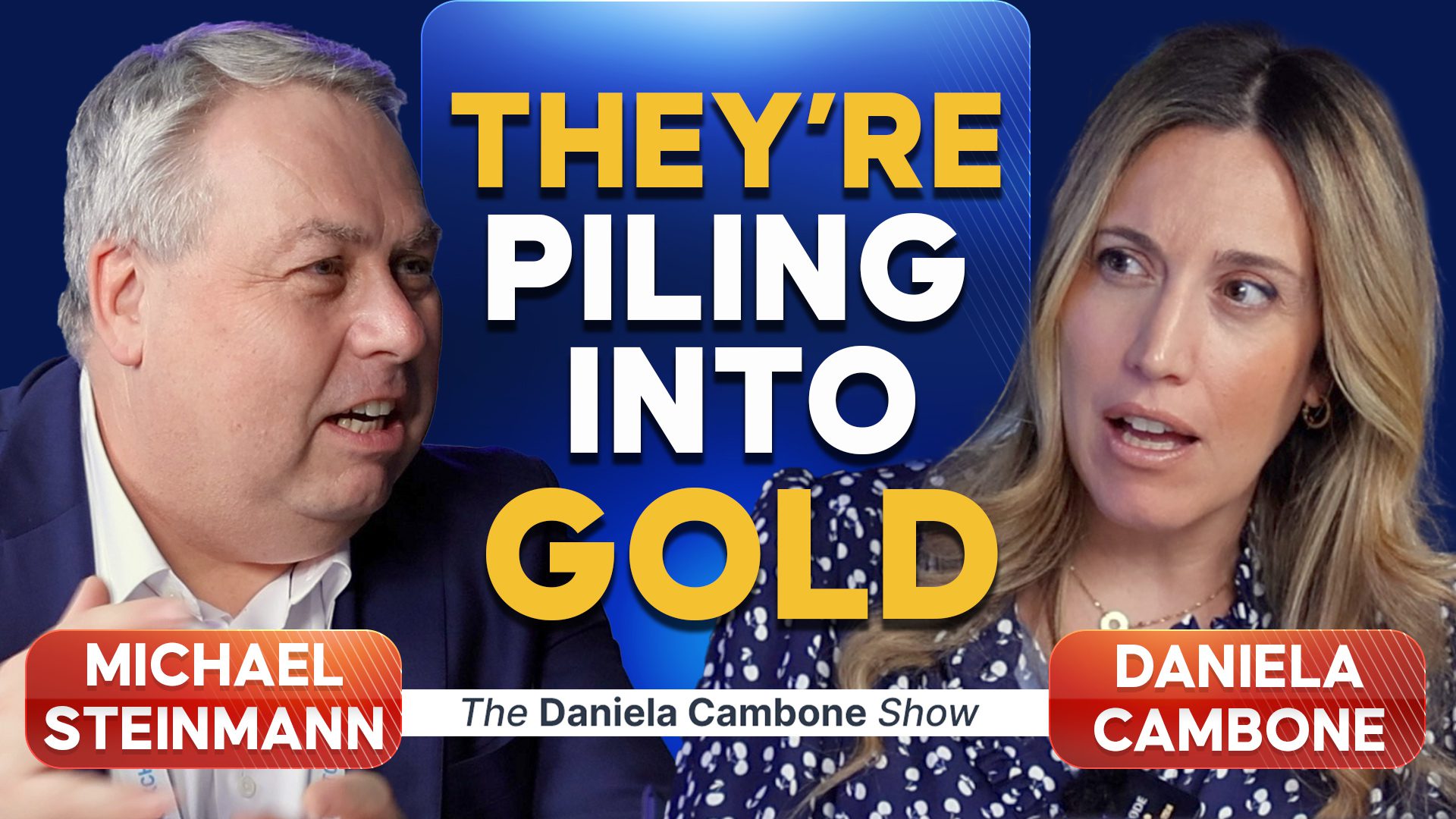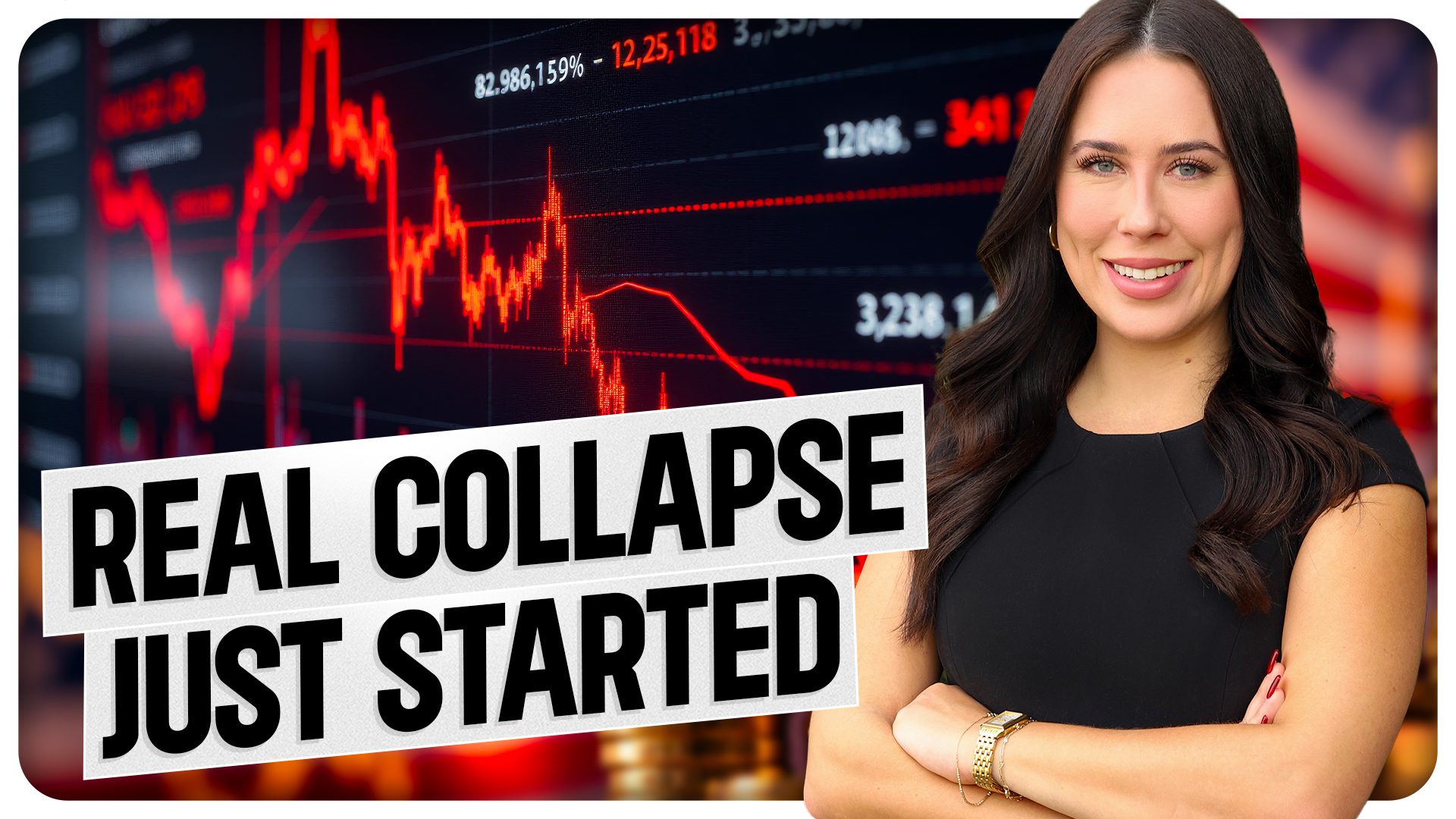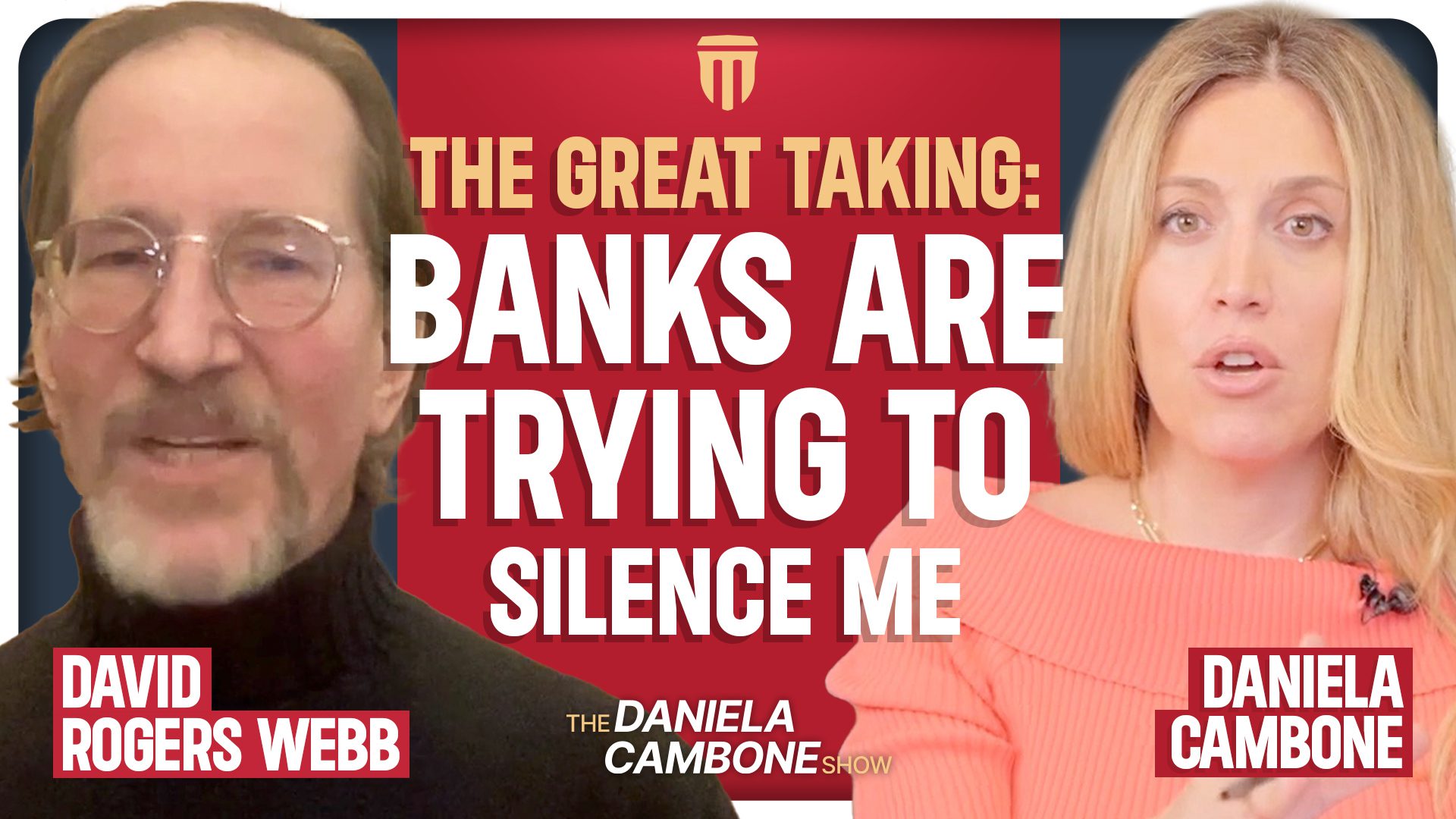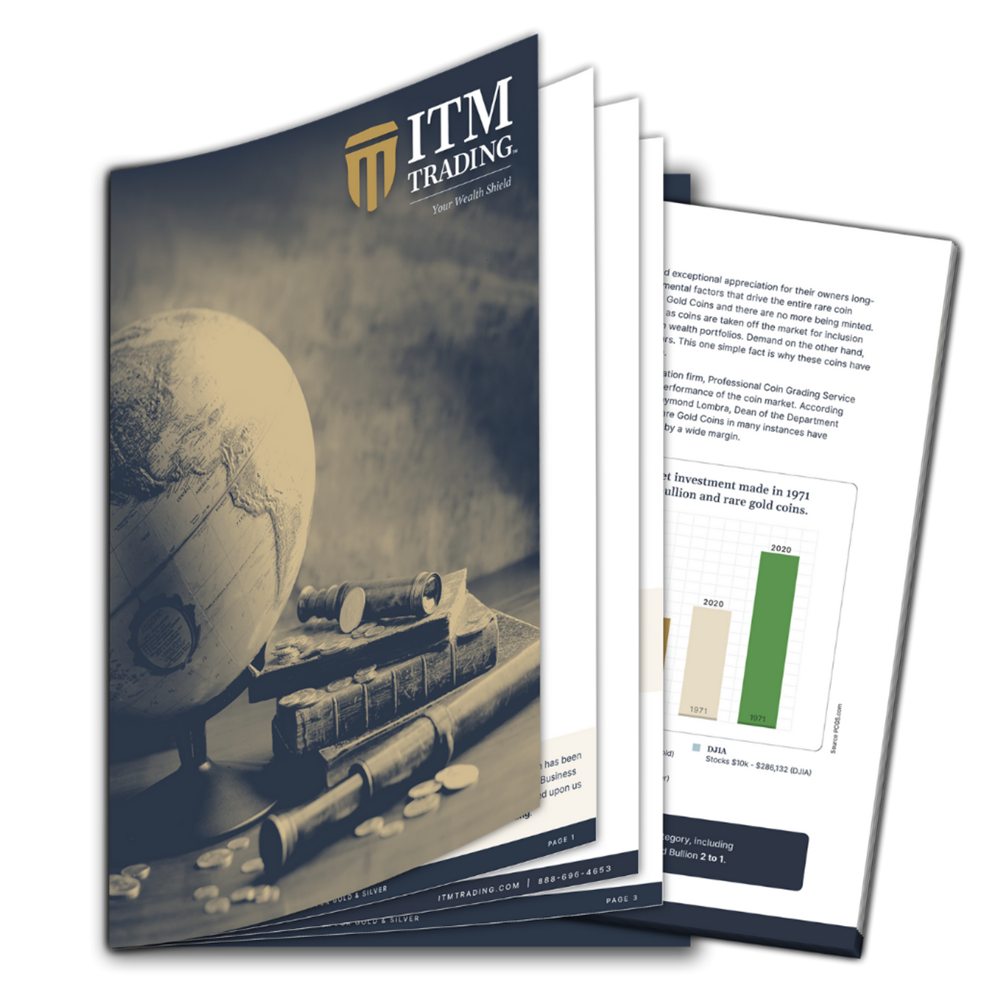We’re Getting Poorer: $140,000 Debt per Household, System is Held up by Welfare Warns Top Economist
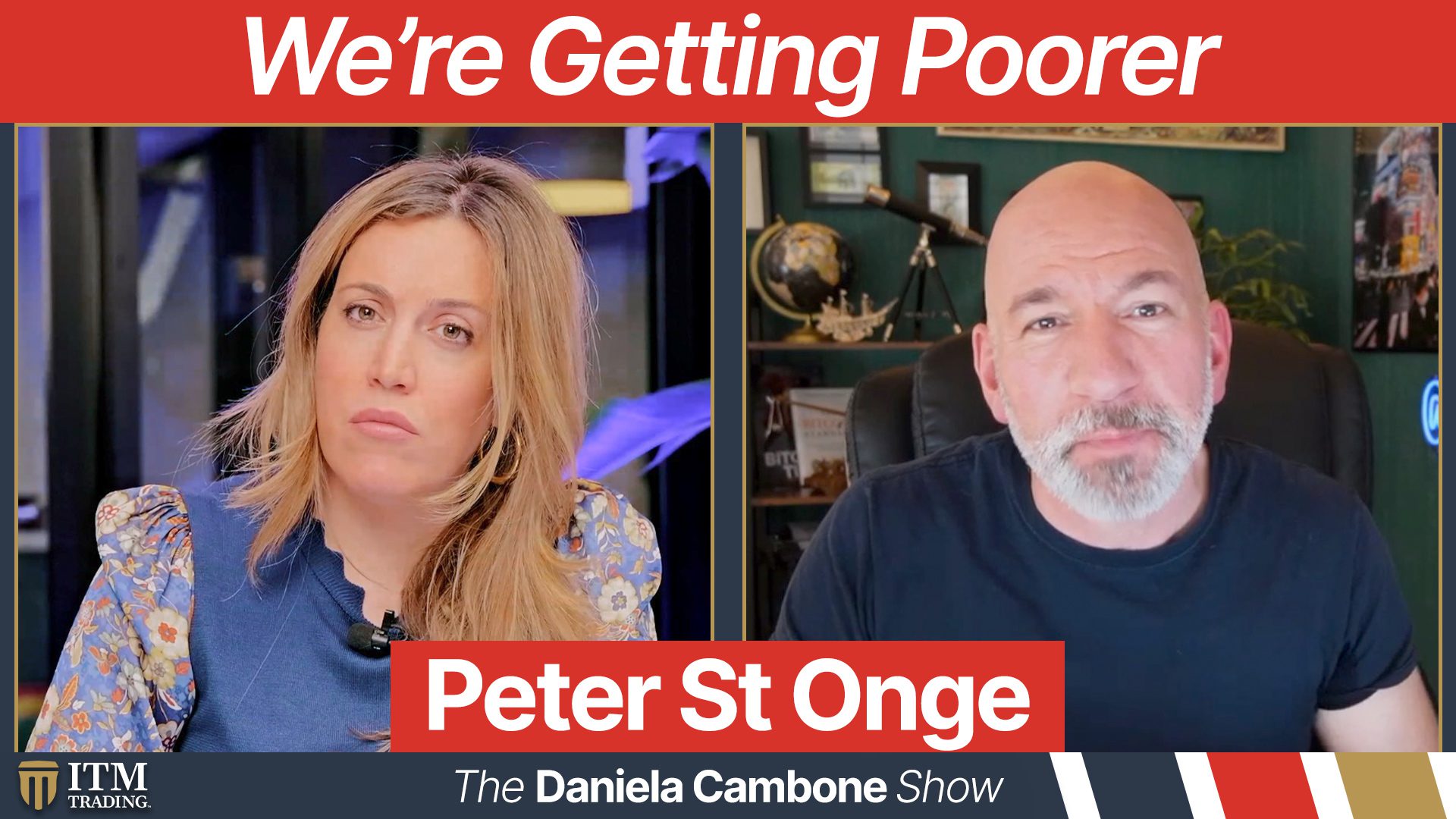
“If you zoom out through American history, every generation was much richer than their parents… it partly broke starting in around 2000,” according to Peter St Onge, former MBA professor and Ph.D economist. In a conversation with Daniela Cambone, he paints a sobering picture of the ‘Bidenomics,’ a term encapsulating the economic challenges facing many Americans today. “If you are frozen on food expenditure, houses are actually going backwards. Life expectancy is going down, which is another gold standard of prosperity. A lot of people, I think, are starting to conclude that we’re certainly not getting twice as rich as our parents anymore,” he asserts. Moreover, St. Onge sheds light on the growing burden of household debt in today’s economy. This mounting debt, he argues, further widens the chasm between reality and the optimistic narratives often portrayed in headlines. To gain deeper insights into these economic realities, watch the video and explore St. Onge’s analysis.
CHAPTERS:
00:00 Banks/CRE reserves
4:41 Fed bailing out banks
6:69 China situation in the U.S.
7:58 Household debt
12:08 We’re becoming poorer
15:58 The greatness of 90s
16:54 Powell’s next move
24:43 Bitcoin/gold
28:34 Return of gold standard
33:07 Crackdown on bitcoin
37:10 Migration crisis
42:24 Work permit
TRANSCRIPT FROM VIDEO:
00:05
Hi, this is Daniela Cambone. Welcome back to the Daniela Cambone show here on ITM Trading. We’re kicking off with a headline from the Financial Times that says, here in the United States, bad commercial real estate loans have overtaken loss reserves at the biggest U.S. banks after a sharp increase in late payments linked to offices, shopping centers and other…
00:26
properties, commercial real estate loans, at least 30 days delinquents soared to 9.3 billion among the top banks last year alone. Joining me to talk about this and so much more, Peter St. Onge, he is my guest today, a PhD economist at the Heritage Foundation. He also makes compelling and fantastic video interviews and podcasts on X on a daily basis. Peter, it’s been a long time coming. Thank you so much. Welcome to the show.
00:54
Oh, thanks for having me on, Danielle. We’re going to be talking about a lot of light stuff here today. Let’s start. Always, always. Always, right? Let’s start with this goodie that the Financial Times did a great report on. Um.
01:10
Basically, they’re saying that the average reserves at JPMorgan Chase, Bank of America, Wells Fargo, Citigroup, Goldman Sachs have fallen from $1.16 to 90 cents for every dollar of commercial real estate debt on which a borrower is at least 30 days late. This is according to filings from the Federal Deposit Insurance Corporation. So for the folks at home listening to this, I mean, it sounds drastic. It sounds pretty bad, Peter.
01:36
Yeah, I think, you know, the banks aren’t in danger of collapsing. They’re, they’re still relatively low numbers, but I think the sort of biggest takeaway from this is that the banks
01:49
are in a world of pain right now, right? You’ve got a lot of commercial real estate that is collapsing. There was just a new story yesterday that an abandoned office building in Los Angeles, not even very old, it’s pretty big one, they’re going to knock it down, they’re going to put up EV car chargers.
02:07
Okay, that’s a pretty pathetic use to knock down a massive office building. And you got no better idea. You know, that’s like turning into a parking lot. So there is a world of pain. Cities like New York or LA are turning into quote urban doom loops where, you know, not only have a lot of companies going to work from home, a lot of companies are going through layoffs right now, right? That’s always going to hit commercial real estate. And then on top of that, you got these urban doom loops in places like San Francisco. So there’s a lot of pain.
02:37
in commercial real estate. And so what you would normally expect is that these banks would be increasing their cover, right? They would be preparing for more pain. They would look at these recent buildings where you’ve had like 80 or 90% losses in San Francisco. And, you know, all of the major banks are gonna be exposed to places like New York, San Francisco. So you would expect them to be preparing for incoming trouble. And instead…
03:05
They’re taking down the cover. In fact, they locked it in half from a dollar 60 to 90 cents on the bad dollar. And so I think what that’s sending a message here is that these are some of the, some of what
03:19
we earned last year when we had this sort of bank crisis early in the year, starting with Silicon Valley bank, and then we had a couple of other bank crashes, the total by deposits, okay, bank crashes and early last year, they were bigger than 2008, but they stopped all of a sudden. The reason they stopped all of a sudden is because Janet Yellen and Jerome Powell came in and said, we will cover everything.
03:46
They looked at the casino, they saw all the gamblers losing money hand over fist, and they said, don’t worry boys. If your bet works out, you keep it. If it doesn’t work out, we’ll cover it. Now, of course, Jerome Powell doesn’t have any money, right? That’s all. That’s either coming out of taxpayers, if it’s treasury, or it’s coming out of dollar holders. If it’s going to be Jerome Powell.
04:10
So the banks are behaving as if they are not worried about a thing, right? They looked at that effectively a pre bailout last year, and they’re saying this looks great. So no matter what comes down the pike, commercial real estate collapsing. No problem. We’re going to go ahead. We’re going to take out the reserves. We’re going to juice up our profits with that. They are draining it out because they know that either taxpayers
04:38
or the Fed are going to come and foot the bill.
04:42
Wow. Okay. Because I was going to say, you know, there’s a quote in the article from Michael Barr, who oversees bank supervision of the Fed. He said they have been closely focused on banks, CRE lending, including how they are reporting their risk internally and whether they provision appropriately and have sufficient capital, blah, blah, blah. But to your point, you’re saying the banks are just like, okay, the Fed will just rescue us and whatever. But okay, so
05:08
Are you saying that’s most likely going to be the scenario that the Fed would just bail them out? But I mean, how much can the system take?
05:17
Yeah, well, that’s what they’ve been doing. I’ve been calling it a pre bailout but things like BTFP Where the fed lends you money based on fictitious asset values See, so that way it doesn’t look like a bailout. They’re just lending you money. You understand. It’s on garbage collateral Okay, but it doesn’t look like a bailout or what janet yellen did with the FDIC where she basically said We’re gonna cover all of it, right? The FDIC has something like a hundred billion dollars and
05:47
is using that to cover $22 trillion of deposits. So again, it doesn’t look like a bailout. It’s for sure a bailout, but it doesn’t look like it. And so, you know, in 2008, when the banks crashed, they had to go hat in hand.
06:03
to Washington, they didn’t have to do that last year. Bigger crash than 2008, no pressure, no concerns, no bank paid op-eds about we’re gonna have the Great Depression if we don’t bail them out, nothing. Why? Because the fix was already in. It’s a pre-bailout.
06:20
Banks now understand that and so it is off to the races with moral hazard. You, you know, one of the universals in finance is that higher risk pays better, right? You’re going to make more money lending your money to some Argentinian hedge fund than you are, you know, to grandma to refinance her house. And so once you have that world where anything that goes wrong, we’re going to bail you out. You don’t even have to go to the press. You don’t even have to do the whole lobbying push. It’s all automatic. When you get to that,
06:50
you are asking for a massive snowball of risk. Massive snowball of risk? Well, you know, you don’t, could we possibly see a China like situation happen here? I think that’s the end game exactly is that China did exactly that. And the problem is it got too big to bail out.
07:14
So that’s where China is right now is that they have pumped so much money into residential housing and into manufacturing. It is too big to bail out. And so now they’re trying to fix it at the edges, but foreign investors are fleeing. That’s been what’s been carrying the Chinese economy for 30 years. So yeah, I think that’s exactly the end game. Now, the problem is that these kinds of things don’t blow up overnight, right? If you give Wall Street a green light to take as much risk as possible,
07:44
In the next couple of years, you’ll probably have a huge tissue fire of economic growth. It’ll be very exciting, right? You’ll have all this risk capital being deployed. And you know, of course, the debt, the payback doesn’t come for a couple of years. Well let’s talk household debt now, Peter, because we’re getting warmed up. So the New York Fed warns of mass defaults as household debt now hits a record 17.0.
08:12
I had to reread that three times. That’s up 3.4 trillion since the pandemic. That’s almost 30,000 per household. On top of the 10 trillion in new federal debt, almost 80,000 per household. In all, the average American household is now carrying over $400,000 in debt. They make one sixth of that. That is clearly unsustainable at this point. Okay. This seems to me like a bigger issue here. Yeah, massive.
08:42
And you say it’s the only thing holding up the economy, debt. Um, talk to me about what the everyday American is living and what’s the solution out of this. Yeah. The situation we’re in is, is pretty weird at the moment. So, you know, the fed cut rates, uh, too low. They made money too easy. They did that to finance the federal government.
09:07
during COVID and of course inflation got away from them. So normally what they would do at that point, you know, if they go to the sort of textbook 101 of central banking, you yank rates up, okay? So that’s what they’ve done so far. And what that does is chokes off the little guy. Well, in theory, it chokes off the entire economy. So, you know, business investment stops, people can’t buy houses, therefore houses aren’t being built and so on. So this is kind of the textbook, right? You induce a recession by choking off
09:37
loan capital, and then that in theory is going to bring your inflation down. What actually happened is that the Fed did do part one, they did choke off the economy. But the thing is that the big, big companies and banks still have plenty of cash.
09:54
because you had all of these trillions that had been sloshing around and things like excess reserves, reverse repo, that money has been coming back out. So what it means is that the economy hasn’t actually been choked, not the entire economy at large. That’s why we still have positive GDP growth, especially with the federal spending that has been just flooding money out. So the economy is not choked, okay? What’s choked is the little guy.
10:23
So if you were, you know, just looking at the, putting a roof on our house, eight to 10% is what that’ll cost you. All right. That’s, and it’s similar rates for Helox. A mortgage of course, is what about 7% at this point? So that’s what’s getting choked off. Now, what that means if you translate that into regular people now is that inflation has been soaring
10:45
Interest costs are soaring. So credit card debt is over 20%. If you try to get a mortgage now, right, you’re looking at 7% or something. Of course, house prices have gone up. So it’s completely prohibitive for people. And then meanwhile, incomes have not kept up with inflation ever since Joe Biden came into office. So you put that together and people are bridging the gap with debt. So they’re taking on additional debt. Now, of course, that’s compounding now at these high rates.
11:14
right, the Fed is now looking at what June for their first potential hike, they keep delaying that
11:20
because inflation is now actually taking off again. So individual Americans are absolutely getting slammed. That was $30,000 in additional debt per household. That’s private debt. So that brings it to about 140,000 per household. The average American household makes something like 60,000. That is an enormous amount of debt, especially now when the debt is coming in at higher rates. If you have existing old debt, like an old mortgage, that’s one thing. Okay, it doesn’t get worse.
11:51
Life goes on. The kids grow up or your wife gets pregnant, you gotta buy a house. Life continues and for various reasons people have to take on new debt. Or anyway, they have to replace old debt with new. And when they do, they’re actually getting savaged.
12:07
Well, that’s why there’s such a disconnect between the reality and the headlines that we’re seeing. I mean, the Wall Street Journal, right on good piece, it’s been 30 years since food ate up this much of your income, and I believe that truly is one of the real headlines out there compared to consumer confidence being up. Like you said, at GDP, it’s been a lot of work. And I think that’s why we’re seeing the headlines.
12:26
positive GDP growth or the jobs are great or look what the S&P is doing. It has to be a strong market. It’s a strong economy, but it’s not like you say for the little guys or middle income.
12:41
That’s the thing. And, you know, there’s been a lot of discussion about government statistics and how they measure things. We started talking about that a lot during the inflation, you know, sort of bull run there under Biden. And a lot of people were comparing the statistics, how they’re calculated today and how they used to be calculated, right? We’re not talking, you know, tin foil hat, crazy alternative statistics, we’re saying, how did they do it 10 years ago or 20 years ago? And a lot of those statistics, at this point, you know, there’s a lot of us who don’t believe them anymore.
13:11
You’ve got revisions where just every single month in a row, they revised down, which, I mean, you’ve got to have some really bad statisticians to keep making a mistake in the same exactly direction for like 14 months. So at that point, people start looking for alternative measures. Are we actually getting richer? And they’re kind of some of the gold standards that you look at is how much food are people able to afford and how big are houses? These things don’t lie.
13:40
cars per capita. Okay, there’s there’s various indicators. Like if you’re asking, are we richer than our parents? Of course, you’ve had new technology and things like this. So you want to control for that. You want to ask is, you know, from day to day, are we actually getting richer? And there that number you just talked about got a video in that in a couple days.
14:00
I mean, that’s just striking, right? So the proportion of Americans’ income that is going to food is back to like 1991 levels. It’s just astounding, right? That’s almost, or that is actually a generation ago. If you zoom out throughout American history, every generation was much richer than their parents. I mean, like twice as rich.
14:24
right to the point where the older generation say, ah, you kids with all the opportunity you have, we can only dream of such things. That broke. It hardly broke starting in well, depending how we apportion blame Wilson, FDR, Nixon, and really around 2000 is kind of when, you know, one of the final nails went in that coffin, where productivity stopped growing. So that was right around
14:51
The dot-com crash which led to a lot of financial regulation and You know also of course nine nine eleven which led to the Patriot Act that then led to a huge amount of regulatory interference in how finance was allocated Anyway, if you look at the productivity numbers, it’s just striking like it keeps getting lower and lower and lower and since 2000 It’s been pretty close to flat Even if you’re using the government numbers now if you zoom out and use some statistics
15:21
like that.
15:22
right? Asking what proportion of your income do you have to put on food? We have completely stopped growing as a society. I think that’s a big reason why you know, the media keeps saying, you know, what’s wrong with people? Why don’t they understand how amazing the Biden economy is? numbers like that are exactly why right? If you are frozen on food expenditure, houses are actually going backwards life expectancy is going down, which is another gold standard of prosperity. A
15:52
starting to conclude that we were certainly not getting twice as rich as our parents anymore. Something broke. Absolutely not. Absolutely not. And I was gonna say, you know, common conversation at our supper table to your point about the parents is like we feel we reflect back to me like, man, the 90s were good. So
16:14
We didn’t think it was that great when we were there, but it turns out… Yeah, but now I’m like, man, I really do miss the 90s, not just for economic reasons, for a whole other slew of reasons. The weirdest part is people looking back in the 1970s and talking about how great things were. I swear to you, I grew up in the 70s. We thought it was horrible. We had…
16:40
If you had told me back then that someday in the future, they’ll look back on this and think that, you know, these were the good old days, I would have assumed that we’re going to like Mad Max, Armageddon. So since it’s our first time speaking of Peter, I’m interested to get your point of view or insights, especially since you’re a PhD economist, you taught master’s classes, you know, you have a slew of academics. Your thoughts on…
17:08
what’s inside Powell’s head and your take on his kind of backpedaling on what he’s going to do with rates and your gut feeling as what they’re going to do. There’s a lot of questions in there, but your thoughts on the direction you think Powell’s going in? Yeah, so Jerome Powell is not an economist. He does not have an economics degree. He has never studied it formally. He’s a lawyer.
17:33
And so where does he learn as central banking? He, you know, he’s been in the organization for a long time. I’m sure he’s had internal training. So he is essentially a company man. He believes and sees the world the way that a sort of bog standard, you know, federal reserve employee from central casting. And so given that he, you know, he’s basically following the script and. The script for the federal reserve.
18:02
What they think they’re doing is they’re turning all the dials on the big economic machine so that you can get just that right magic mix of inflation and economic growth so that, you know, whatever.
18:18
over 20 or 30 years, we can be richer as a society. So that’s what they think they’re doing. Now, if you actually look back at the origins of the Federal Reserve, like who bought it? Why is it there? You know, it didn’t just fall out of the sky. Somebody worked very, very hard to install that thing. And of course, that was the giant banks.
18:36
So it was, uh, if anybody’s familiar with the creature from Jekyll Island, that, that goes through. Well, we just had Griffin on. Did you really? Fantastic. Yes. Okay. Good. All right. So 92 years young and still, still sharp, lucid, bright. Oh, so sharp. Incredible. All right. I didn’t want to break your channel thought. Good. I got excited. So your listeners will be familiar then with the origins of the federal reserve.
19:04
And, you know, fundamentally, the deal with a central bank has always been that the banks get inflation. And what the government gets is somebody to buy up his debt.
19:15
All right. So this is, this is the origins of sort of the demon pact of central banking, starting in, you know, the, the Bank of England was founded, it essentially handed over control of the money, in other words, a licensed counterfeiting operation, in exchange for buying up the national debt so that the government wouldn’t have to pay interest on anymore. So fundamentally, what that means is that central banks want to inflate, always and everywhere that is their purpose. That’s why they were created. Their purpose is to inflate.
19:44
to print as much money as possible and hand it partly to Wall Street in the form of cheaper loans that they can take a cut on and partly to the government, which turns out to be by far the largest borrower in America. So cheap loans is excellent for the federal government. They can seize a bunch of money, essentially stealing it from everybody who has a dollar to begin with and they’re fantastic for banks. Now,
20:12
When you read newspaper articles in mainstream media, a lot of the times when they’re talking about the Fed, they’ll talk about the Fed’s fight against inflation. Right. And so normal people might be forgiven for thinking that the Fed exists to fight inflation, which is hilarious because the only reason to create a central bank, its only purpose in life is to print money.
20:37
It is a licensed counterfeiting, in other words, inflation. So the reason of course is that the Fed is aware that people, voters don’t like inflation. And if they let inflation rip too hard, then the voters are gonna put pressure on Congress and then Congress or the president, that’s then gonna come down to them. And they’re afraid that they’ll lose their independence, meaning that they won’t be able to counterfeit anymore. Now, when that happens, interestingly enough, typically Congress,
21:05
There have been banks that have lost independence and the government has essentially taken them over when they do that Actually, it’s off to the races because governments have absolutely no self-control whatsoever But at any rate, so the Fed is not fighting inflation Because they hate inflation they are fighting inflation to keep it low enough that the voters don’t put pressure on Congress to then punish the Fed right so empirically The the literature and central bankers argues for about 2%
21:35
inflation. Now, of course, 2% is actually much more than that in terms of money printing, right, because the population is getting bigger, the economy is growing, the global population is growing. So 2 is probably closer to 5, realistically. So that’s roughly a trillion dollars a year that are counterfeited by the Federal Reserve. And when they fight inflation, what they’re really doing is they don’t want it to get to 4%, 5%, 6% where voters start getting upset, right? And so they try to rein that in.
22:04
Now of course, they’re also slaves to a second set of headlines, which is economic growth, which the most salient number for that for voters tends to be jobs.
22:14
That’s sort of what sticks in people’s head. If you talk about GDP, most people don’t have a strong opinion about that. Talk about jobs, they do. And really, they’re essentially the same thing. So the Fed, their goal is not to fine tune to get just that right mix of inflation growth. Their goal is to inflate as much as possible whilst trying to fine tune the negative headlines about the inflation they caused and the recessions that they caused to try to counter it. Because recessions do not happen on their own.
22:44
It is not natural. Think about it, right? What is a recession? So, you’ve got a bunch of businessmen who are, you know, starting businesses or operating businesses and every so often they screw up and they lose a bunch of money. They have to downsize. They go out of business. Okay, so, you know, whatever. 3% of businessmen every year screw up and they fail out of the game. But in a recession, it’s more like 20%. So why does that happen? Why does everybody get stupid all of a sudden? Right?
23:14
It’s not natural. It should, you know, you should have year in year out, most businesses are doing okay, some are doing great, some are doing terrible. And you know, you subtract one from the other and you’ve got, you know, whatever regular growth. Instead, what the Fed does is by manipulating interest rates, it gives you this boom bust cycle. So you get this big tissue fire boom, where nobody can do no wrong.
23:37
Right? The guy who started WeWork, that, that stupid office sharing, he could get tens of billions of dollars in funding. Uber was what? Losing money for like seven years or something. All right. So money is free because the fed made it free. So nobody screws up. No businessmen go out of it. You could be the biggest idiot on wall street and you’re not going bus because you just borrow more money. Right? You know, Uber, you could lose what? I think it was billions of dollars. They lost every single year for seven years.
24:06
and they just borrow more money. So nobody fails. And then when you choke off the money all of a sudden, now, yes, 20% fail. All right, so the recession is caused by the Fed. It is not natural. There is no business cycle. It is a central bank cycle. So crazy. The inflation is caused by the Fed. So the Fed is not fine tuning some, you know, like.
24:32
uh, physical phenomenon of nature that’s just out there. They’re fine tuning the damage they do to the world. It’s, it’s absolutely. And thank you for explaining that so brilliantly and plainly. Um, it’s absolutely mind boggling and I’m going to go out on a limb, but
24:56
Do you believe in the end the fed movement then? Oh my God, for sure. Absolutely. End it. Okay, that’s not a limb. Go back to gold, go back to Bitcoin, whatever you need, yeah.
25:10
Talk to me about that. I mean, I know you’re a big believer in Bitcoin. You’re a believer in gold. So. Yeah, I’ll take them both. Yeah. Like physical gold or? Yeah, I mean, generally historically, when you’ve got a gold standard, you’ll have the physical gold centralized somewhere, like in banks or warehouses or something. And then people will be using some representation of that. Okay. And you know, like.
25:40
like a dollar.
25:41
Right. And then, you know, the idea is that you can take your physical paper dollar, and you can go and trade that for gold at a bank if you want to. Okay. So generally, the physical gold itself is centralized somewhere. And so that and you know, we had we operated under gold standard until the 1970s. You know, it’s not science fiction, the banking system worked essentially identically to how it does today. And of course, up until the Fed was created
26:11
you know, we had a very sophisticated economy in many ways is many ways it was more sophisticated than it is today, obviously lower technology, but it was sort of more complex in many ways. And that operated without even a central bank. So it’s it’s completely feasible. Andrew Jackson actually ended the last central bank we had in I believe 1836 somewhere around there. And he ended it specifically because that’s what the bank was doing.
26:41
booms, the canal boom, there was this boom after boom of, you know, kind of like dot com style stuff.
26:48
Uh, so, uh, what is it? The, the East Indies, but I mean, it was just, it, you know, it was kind of these, these analysts, um, you know, almost like the China boom or whatnot, like, uh, you kind of all the lemmings would go towards some investment thesis and then you have this big boom and all this money will get plowed in there and then they would lose it all. So over and over the second bank kept doing that. The American people back then were a lot smarter because we didn’t have, uh, government schools. They were, by the way, genuinely smart as actually data on that. They were much, much smarter.
27:18
the 19th century, we are idiots today. But anyway, so people could actually understand what the Fed was doing, they could, you know, comprehend the arguments and, you know, enough of them understood it that he ended up getting rid of the bank. So you can absolutely get rid of it. In terms of gold versus Bitcoin, both are great. You know, Bitcoin is much smaller.
27:40
And it’s obviously more volatile. There’s also a lot less institutional memory. So like there are bankers today who actually grew up under a gold standard. I mean, like they understand how it all works, right? To a lot of people, Bitcoin is gonna sound very science fiction. You have of course just take the standard gold standard and you just duplicate that. I mean, you don’t have to do anything. It would naturally bottom up duplicate. The gold standard system of course was bottom up. The government didn’t go.
28:08
created that was just that was the correct way to do it. So you can absolutely do it with gold or Bitcoin. If it were to happen like tomorrow that I imagine we would go to gold. Right. It happened. I mean, if the US dollar hyperinflated, and all the other currencies did too, then I imagine we would go to gold just because there’s more familiarity with it. If you know, the crash is another 2030 years off, and I think there’s a good chance we go to Bitcoin.
28:35
So it’s not, so it is plausible for you that we could see some sort of return to a gold standard or the dollar backed by.
28:49
Yeah, I think it’s inevitable. You know, when we talk about all these unsustainable trends right now, the debt being driven up, I mean, it has no natural enemy, right? There are very, very strong incentives for governments all over the world to keep doing that. And there’s no countervailing pressure in the other direction. Historically, fiat has always collapsed.
29:12
We’ve only really had global fiat now for 50 years since the Nixon shock. Uh, that’s, you know, pretty close to the natural, um, lifespan of paper currencies. So I think it’s absolutely guaranteed. In fact, that’s a big reason why I do own Bitcoin. Uh, I, I carry sponsors on my daily videos, uh, from Bitcoin companies as well as gold companies. And because if you. So.
29:42
In my view, fiat is there’s near 100% probability that fiat is doomed. Okay. The only question is when, right? Is that going to happen in five years and 20 years and 50 years? And you can discount all of these, of course, you can just take net present values so you can discount all these probabilities, and then you multiply that by what would the asset be worth if it replaced paper currency. So in gold’s case, it would be worth something like 12 times more what it is today, memory.
30:11
And in Bitcoin’s case, it would be something like 150 times what it is today. So two or three million something like that per Bitcoin. So the given or if one believes that it’s certain that we’re going to go to a hard money and
30:27
even if you believe that it’s 99% certain that that’s going to be gold, then Bitcoin is still, still undervalued, right? Because you’re taking, you know, whatever 123 times or whatever the number is, you multiply that by 1% odds in the timeframe. And then of course the next question becomes, all right, well if we do go to gold and it’s gold, not Bitcoin, then what are the odds over time that Bitcoin is going to replace gold?
30:53
And that to me, that strikes me as near certainty. Again, not in five years, maybe not even 30 years, maybe not in 50 years, right? Maybe in 50 years, we’re gonna have the gold standard, but Bitcoin is still gonna be there. I think Bitcoin is architecturally superior to gold. I love gold like one of my own children, but Bitcoin is in fact superior to it. Oh boy. It has better supply. I’m gonna have to bring you back. Just to do a segment.
31:20
on Bitcoin versus gold. I vowed I wouldn’t do another debate on that after Michael Saylor Juistra, but I’m feeling one is brewing. Yeah, no, I, I, I, I,
31:35
But I love them both. Okay, if we go to gold and not Bitcoin, I will be very, very happy. So I never say a bad word about gold, but I do think that, especially in the long run, right? The issue with gold is that it has to be centralized, right? Like if you’re running around with gold coins, it’s really hard to play, to like pay, you know, to like buy something on Amazon. Okay, you’ve gotta have some sort of,
32:03
medium of payment like a credit card or something which means that the gold fundamentally has to be concentrated somewhere it’s got to be in a warehouse somewhere and it’s got to be a pretty sturdy warehouse right I mean you know how many movies are there where they’re breaking into steal the gold it’s got to be in a you know like like a pretty impressive building you can’t have a gold standard where you say I have the gold but it’s hidden
32:25
Okay, you actually have to like show people the goal. I mean, like literally, you got to have like a camera rolling, you say, here’s the coordinates. Here, I’m proving this is the goal. I’m going to cut it in half. So what does that mean? That means it’s very, very easy for governments to come over and visit your gold warehouse and to come up with creative things for you to do with that goal. Right? So this is the fundamental flaw of gold. It is eminently, sizable. It is the most
32:55
you publicly announce where it is, you prove that it’s there at any given moment, it is literally the easiest thing on earth for governments to seize. Okay, so like I said, I really think this needs its own segment, but let me just go there a second. Let me just go there a second. So, and I’m sure, and like, you know, this might be an eye roll moment, but you know, I’m sure you get this question of, well, are you concerned at all about governments cracking down?
33:23
on Bitcoin. I mean, obviously we’ve heard Jamie Dimon’s thoughts on it and every once in a while we’ll hear some politician come out and blurt out, we might want to stop it or we want to make it illegal or whatever. And then it quiets down and then someone else opens their mouth again. So does that concern you at all when it comes to Bitcoin? Obviously not, right?
33:46
Well, I mean, it does, but they did the same thing with gold under FDR, right? It was literally illegal to own gold. And guess what? A lot of people did hold onto their gold. Amazingly, there’s lots of people who don’t obey the government. Um, I wrote an article on this. Well, that’s why a lot of people like the pre 1933 is that can’t be confiscated.
34:05
Exactly. I wrote an article on this a couple years ago where I was talking about a band backfiring and it if you sort of go through the game theory on it, right, so if you were to ban it tomorrow, let’s just imagine that the federal government, Washington bans Bitcoin, can’t own it, can’t use it. So of course, it immediately flushes out of the legitimate financial system. Right. Now, it doesn’t affect other countries.
34:31
Right. But it means that there’s only two categories of people who are still owning and using Bitcoin, which are either foreigners and. How would you call them? Any anyway, anarchists, people who disobey government rules. Now you can keep going with that in theory, right? You can keep, you know, the next country bands at the next one, the next one. And each time think of it like, uh, I don’t know, like a tsunami going up a canyon, right? You got.
34:58
You know, you got the water going along and it’s gonna hit shore. It’s gonna be this big wave, but it hits a canyon. And so, you know, it doesn’t smooth out like that. It goes up like a just shoots up in the air. All right. So every country that bans Bitcoin now you are asymptotically you are gradually pushing all of that value to a smaller and smaller group.
35:19
of let’s be frank, crazy people, increasingly crazy people, you are essentially handing all the money in the world to like literal anarcho-capitalists. So in a sense, I’m like, bring it. You’re going to pull all the money out of these normie boomers and you’re going to hand it all. Like, have you met Bitcoiners? Like really passionate Bitcoiners? That’s really who you’re going to hand all the money in the world to? I’m like, bring it guys. I have, many. Yeah.
35:48
So, but you know, realistically, even if they do ban it, of course, that’s only one country, all of the other countries act as a model. Right? So if they ban Bitcoin, and you know, the dollar keeps inflating. And if over time, you got all these people in these other countries, say, Japan, who are protecting their assets with Bitcoin, that starts to influence Americans. You know, it’s, it’s, it’s an example to them.
36:17
And of course, I think the most important thing is that unless or it, it is essentially impossible to ban Bitcoin itself, right? You can ban its use in certain countries, which remember that doesn’t actually mean you stop the use. It just means that you, you know, put probabilities of getting punished. You’re, you’re essentially taxing the use.
36:42
in terms of drug or in terms of risk. You know, this is what we see in drugs, for example, right? If you completely legalized cocaine, more people would use it, but banning it does not mean that it disappears completely. So, I mean, honestly, I would be shocked if more countries didn’t ban Bitcoin. I would not be completely shocked if the United States government banned Bitcoin sooner or later, but they banned gold too, and gold did not end. It is still here.
37:11
To be continued on this topic, I promised I’d get you out of here on time, but I need to sneak in one more talking point because I know you’ve been doing a lot of writing on the economic cost of the migration crisis. Obviously, a topic dear to my heart since I live in New York City. So I want to talk about the financial pressure that comes with the housing, the feeding of these migrants. I know you crunched some numbers. It’s $394 per day per migrant in New York City.
37:40
That’s 144,000 per year. You say this might be the only bright spot of the economy. Talk to me a little bit about the real cost of the migration crisis. It is absolutely shocking. So I’ve spent most of my adult life as an immigrant Japan, Taiwan, Mexico, ironically Argentina, a lot of places. I am a huge fan of immigrants. I have been one myself.
38:08
The thing is there is a world of difference. I won, right. Yeah, there is a whole world of difference between legal migrants and illegal migrants. It’s the same difference between house guests at your dinner party and burglars.
38:22
Okay, if you do not invite people in, they are not welcome. And why don’t countries invite everybody in the world in? Well, typically because there’s some kind of quality control. It might be say a criminal background check, which we do not do with these migrants because they’re undocumented by definition. I mean, what idiot is going to come from Honduras and bring their police record with them, right? I mean, come on. Uh, so, you know, we don’t have background checks, but in this context, we also, they’re, they’re probably not skilled.
38:52
And, you know, so when they first get here, we’re looking at the numbers that you just mentioned, $394 per day, that’s $144,000 per year being spent in New York. You’ve got similar amounts all over the country now because, you know, you got these politicians who are virtue signaling by how generous they’re going to be. But that only begins to capture it because, or that only begins to capture it because once these people are here,
39:18
Generally, the reason why they couldn’t migrate legally is because they have no skills. So they are going to be wards of the state forever. If you look at the welfare usage for legal migrants, legal immigrants tends to be lower than native born.
39:37
because they’re hardworking and because we have selection mechanisms. There’s some meritocracy where we don’t just take anybody. You know, you got to, you got to impress in some way. You got to have a skill set or something. Ooh, these, these, uh, random migrants, uh, that we’re seeing now. I mean, that’s, that’s just a whole nother basket. So we have got trillions, I think, coming down the line. Uh, if those people, uh, stay in the country. And one of the ironies of it is that when we’re talking about things like GDP growth, you know, when Joe Biden brags about how great.
40:07
economy is a huge part of what’s holding that up is what the Wall Street Journal called the welfare industrial complex where for example half of all the jobs created in 2023 were either government workers or quote social assistance which is government related and a huge part of that right now is the migrants see so when New York spends 144,000 on a migrant that shows up as GDP
40:35
That gets counted in the statistics as I’ll be darned. New York is doing fantastic. Ding, ding, ding, yes. Because government spending is GDP. It should not because it’s cost.
40:45
but it is counted as GDP. It’s counted as economic productivity. That’s why the Soviet Union, the Soviet Union had incredible GDP numbers. There are all kinds of debates back in the 60s because Soviet Union had growth rates of like 7, 8%. You know, this was Khrushchev saying, we will bury you. He meant bury you economically because our economy is doing so amazing. It’s amazing what kind of numbers you can come out with when you’re counting the government. And I think, Peter, you know, there’s obviously a healthy balance, right, of…
41:14
you know, having a heart and like making room and space for asylum seekers, but not just, you know, opening the floodgates, right? Well, anybody who came through Mexico, why didn’t they stop in Mexico? Why was Mexico not good enough for them? So no, I don’t think there’s any bona fides who are coming in.
41:36
to the country, I think, you know, we have an immigration process. Every country on earth does, including Mexico, by the way, Mexico, back in the day, they had tons of illegal migrants coming in from Guatemala. This is like back in the nineties and they had a camp set up where they would put them in there for years on end to teach them a lesson as a warning to the other Guatemalans coming in. Every country protects its borders. They always have these countries who are
42:04
inviting their citizens to come here, they protect their own borders. You can be darn sure. The only reason Mexico waves everybody through is because they know they’re not sticking around because they are not bona fide minors. They’re not fleeing a civil war. They are looking for the best country to move to. So let me ask you this.
42:24
I went through the green card process, work permit process. I got my green card in three months and it was fine. But let me ask you this, do you think it should become easier to access? Because I understand that for many it’s very difficult to get even a work permit. Do you think that should be an easier access? Economically, absolutely. It should be a heck of a lot easier.
42:54
I think it might even have been Trump. But anyway, somebody was saying we should staple a green card to every PhD issued anywhere in the world. That’s correct. Economically. Now, politically, I think it’s a little bit trickier because like, to be frank, immigrants are terrible at voting. They tend to vote socialists, even Canadians with all due respect.
43:14
And so I think in my personal view, economically, we should make it much, much easier to come here. Anybody who’s got like decent, you know, qualifications, if you’re a doctor, if you’re an entrepreneur, if you’ve already started a business, I would welcome all of those people here. However, I would not give them the vote until the next generation.
43:36
All right. Well, on that note, I promised I’d get you out of here on time. Peter St. Ange, you are welcome back on the show anytime. I was going to say you’re too cool to be an economist, but I did see that you are a former, you’re a former bartender. Yes. What was your best drink? Oh my God. Long Island ice tea. It’s a challenging drink too. If you
44:01
If you’re angry at your bartender, have a make up eight of those. He’ll love you. A lot. There you go. That was the hardest question of the interview. Peter St. Onge, merci. Thank you. All right. Thank you, Danielle. Well, we’ll see you soon. And thank you for watching. We’ll have more great content coming your way. So be sure to stay tuned to the Daniela Cambone show and sign up at danielacambone.com and you can catch Peter daily with incredible videos on X so be sure to stay tuned.
44:30
We’ll have more great stuff coming your way. That’s it for me. Thanks for watching.
SOURCES:
https://twitter.com/profstonge
https://www.heritage.org/staff/peter-st-onge
https://www.youtube.com/@Profstonge/videos
https://www.youtube.com/watch?v=QdZoxdYSP0E
https://www.ft.com/content/4114454c-a924-4929-85f4-5360b2b871c6
https://twitter.com/profstonge/status/1760295494469791906
https://www.wsj.com/articles/the-welfare-industrial-complex-is-booming-3a7ad15c
